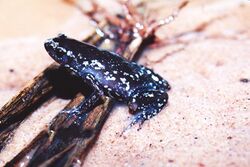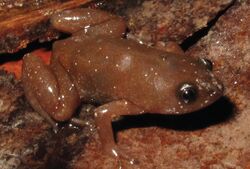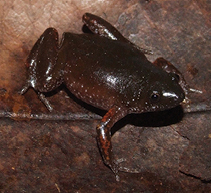Biology:Chiasmocleis
| Chiasmocleis | |
|---|---|

| |
| Chiasmocleis albopunctata | |
| Scientific classification | |
| Domain: | Eukaryota |
| Kingdom: | Animalia |
| Phylum: | Chordata |
| Class: | Amphibia |
| Order: | Anura |
| Family: | Microhylidae |
| Subfamily: | Gastrophryninae |
| Genus: | Chiasmocleis Méhelÿ, 1904 |
| Type species | |
| Engystoma albopunctatum Boettger, 1885
| |
| Species | |
|
36 species (see text) | |
| Synonyms[1] | |
| |
Chiasmocleis is a genus of microhylid frogs.[1][2] They are found in tropical South America north and east of the Andes. Their common name is humming frogs or silent frogs, the latter referring to the formerly recognized Syncope.[1]
Taxonomy
There has been various attempts to delimit this genus in a way that would make it monophyletic. As of mid 2021,[1] it is recognized as including the former Syncope, but consisting of three clades ranked as subgenera:[1][3]
- Dubois, Ohler, and Pyron, 2021 (syn. Unicus, Relictus) Méhelÿ, 1904
- Syncope Chiasmocleis
- Walker, 1973 Relictocleis
Of these, Relictocleis is the most divergent[3] and may even be considered a separate, monotypic genus, with Relictocleis gnoma as its sole member.[1]
Description
Chiasmocleis are small-bodied frogs with small limbs. They are sexually dimorphic, with males having darker chin, abundant to no dermal spines, and variable degree of pedal webbing. Subgenus Syncope is characterized by size reduction and reduction or loss of phalanges and digits. Also Relictocleis are particularly small.[3]
Ecology
Chiasmocleis are fossorial or semi-fossorial and well camouflaged among the leaf litter or underground. They only forage on the surface for a few days during periods of explosive breeding at the beginning of the rainy season. They occur in both forested and open environments.[3]
Species
The following species are recognised in the genus Chiasmocleis:[1]
- Chiasmocleis gnoma (Cruz, Caramaschi, and Freire, 1999)
- (Walker and Duellman, 1974) (Canedo, Dixo, and Pombal, 2004)
- Chiasmocleis haddadi (Peloso, Sturaro, Forlani, Gaucher, Motta, and Wheeler, 2014)
- Chiasmocleis hudsoni Chiasmocleis antenori
- (Parker, 1940) Chiasmocleis jimi
- (Caramaschi and Cruz, 2001) Chiasmocleis lacrimae
- (Walker, 1973) (Peloso, Sturaro, Forlani, Gaucher, Motta, and Wheeler, 2014)
- Chiasmocleis leucosticta (Boulenger, 1888)
- Chiasmocleis magnova Chiasmocleis atlantica
- (Moravec and Köhler, 2007) Chiasmocleis mantiqueira
- (Cruz, Feio, and Cassini, 2007) Chiasmocleis albopunctata
- (Cruz, Caramaschi, and Izecksohn, 1997) (Caramaschi and Cruz, 1997)
- Chiasmocleis migueli (Forlani, Tonini, Cruz, Zaher, and de Sá, 2017)
- Chiasmocleis papachibe Chiasmocleis avilapiresae
- (Peloso, Sturaro, Forlani, Gaucher, Motta, and Wheeler, 2014) Chiasmocleis parkeri
- (Almendáriz C., Brito-M., Batallas-R., Vaca-Guerrero, and Ron, 2017) Chiasmocleis quilombola
- (Peloso and Sturaro, 2008) (Tonini, Forlani, and de Sá, 2014)
- Chiasmocleis royi (Peloso, Sturaro, Forlani, Gaucher, Motta, and Wheeler, 2014)
- Chiasmocleis sapiranga Chiasmocleis bassleri
- (Cruz, Caramaschi, and Napoli, 2007) Chiasmocleis schubarti
- (Bokermann, 1952) Chiasmocleis alagoana
- (Boettger, 1885) (Dunn, 1949)
- (Dunn, 1949) Chiasmocleis supercilialba
- (Morales and McDiarmid, 2009) Chiasmocleis bicegoi
- (Duellman and Mendelson, 1995) Chiasmocleis ventrimaculata
- (Andersson, 1945) (Miranda-Ribeiro, 1920)
- (Forlani, Tonini, Cruz, Zaher, and de Sá, 2017 Chiasmocleis capixaba
- Chiasmocleis altomontana (Cruz, Caramaschi, and Izecksohn, 1997)
- Chiasmocleis carvalhoi (Nelson, 1975)
- Chiasmocleis centralis (Forlani, Tonini, Cruz, Zaher, and de Sá, 2017)
- (Bokermann, 1952) Chiasmocleis cordeiroi
- (Caramaschi and Pimenta, 2003) Chiasmocleis crucis
- Chiasmocleis anatipes (Caramaschi and Pimenta, 2003)
- Chiasmocleis devriesi Chiasmocleis veracruz
- Chiasmocleis tridactyla (Funk and Cannatella, 2009)
- Chiasmocleis shudikarensis Chiasmocleis mehelyi
References
- ↑ 1.0 1.1 1.2 1.3 1.4 1.5 1.6 Frost, Darrel R. (2021). "Chiasmocleis Méhely, 1904". Amphibian Species of the World: An Online Reference. Version 6.1. American Museum of Natural History. doi:10.5531/db.vz.0001. https://amphibiansoftheworld.amnh.org/Amphibia/Anura/Microhylidae/Gastrophryninae/Chiasmocleis.
- ↑ "Chiasmocleis Méhely, 1904". Integrated Taxonomic Information System. https://www.itis.gov/servlet/SingleRpt/SingleRpt?search_topic=TSN&search_value=207076.
- ↑ 3.0 3.1 3.2 3.3 de Sá, Rafael O.; Tonini, João Filipe Riva; van Huss, Hannah; Long, Alex; Cuddy, Travis; Forlani, Mauricio C.; Peloso, Pedro L.V.; Zaher, Hussam et al. (2019). "Multiple connections between Amazonia and Atlantic Forest shaped the phylogenetic and morphological diversity of Chiasmocleis Mehely, 1904 (Anura: Microhylidae: Gastrophryninae)". Molecular Phylogenetics and Evolution 130: 198–210. doi:10.1016/j.ympev.2018.10.021. PMID 30347238.
Wikidata ☰ Q617865 entry
 |



